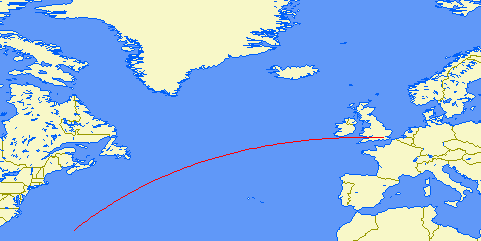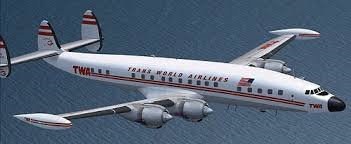I was talking with an acquaintance not long ago who was complaining about a commercial flight that had arrived 20 minutes late and how much of a problem it was and it got me thinking. Twenty minutes is actually pretty darn close to on time. Now, I am not saying we shouldn’t strive for perfection, and if that delay had meant a missed connection to another flight, it certainly would have been inconvenient, but it really wouldn’t be all that earth shattering in the grand scheme of things. In fact, if we think about the perspective of aviation history, it is actually pretty amazing we are as on time and accurate as we are today. The history of aviation wasn’t always quite so perfect.
I am reminded of two stories from friends that really illustrate the perspective.
 This past summer we were visiting friends in Bermuda and got talking about how their family came to Bermuda originally. While Martin came to Bermuda after meeting his dear wife Jo, she was born on the island and it was her grandparents that had been the first generation of her family to emigrate to Bermuda.
This past summer we were visiting friends in Bermuda and got talking about how their family came to Bermuda originally. While Martin came to Bermuda after meeting his dear wife Jo, she was born on the island and it was her grandparents that had been the first generation of her family to emigrate to Bermuda.
While her grandparents airplane arrived successfully from England, the flights scheduled before and after theirs departed, but never arrived. Now, we aren’t talking about 1910 here, we are talking about a time period shortly after WWII.
Hmmm, I thought. Those odds weren’t great, 1 of that particular batch of 3 made it across the ocean to the destination. I can’t imagine we would accept those odds in modern flight operations.
A little closer to modern times, I recall a discussion with a friend who flew for TWA in 727s in the early stages of his career. Talking about some of his first long international legs, he conveyed a story about coming back from South America and “navigating” using an NDB somewhere on the east coast with heavy thunderstorm activity in the area.
For those that don’t know (and I know many of our younger generation of pilots will never have the “pleasure” of using NDBs for navigation), ADF receivers are rather susceptible to lightning strikes. They will regularly swing in the direction of a nearby strike.
While he was navigating using this beacon, he said the ADF needle looked more like a windshield washer as it swung back and forth between lightning strikes. It was practically useless as a navigation tool for him.
As a fairly new First Officer, he reluctantly asked his crusty old captain, “what am I supposed to be using for navigation if this thing is not working?”
He said the old captain smirked and baited him a bit.
“Why don’t you query ATC and see if they can help you?” he prodded his newbie FO.
So he did.
ATC’s response, “You see the aircraft about 15 miles in front of you on your TCAS right?”
He acknowledged he did.
“Well, just follow them, they are probably going the right direction.”
Wow. That’s some highly accurate navigation. Follow the guy in front of you and hope he is going the right way.
I wonder what the passengers would have thought if they knew the pilots up front only generally knew they were headed in the right direction? I know it wouldn’t be acceptable now.
To put even that in perspective, they had something to work with. They were in contact with ATC, had a TCAS and other aircraft to follow, and some form of navigation (the NDB when it was kind of working). The crusty old captain told my friend, this is way better than the old days.
Huh? Yeah. It was. The captain relayed some “war stories” from the old days.
 Having cut his teeth flying trans-Atlantic routes in Connies (planes that I still think rank up there as the most beautiful planes ever built, especially the Super Connie).
Having cut his teeth flying trans-Atlantic routes in Connies (planes that I still think rank up there as the most beautiful planes ever built, especially the Super Connie).
Once they left New York on the way to London they were largely without navigation aids or ATC communications through the majority of the route.
“How did you know you were on course?” he remembers asking the captain.
“Well, we knew we took off on a heading and we turned right 10 degrees every hour or so, the north pole passed off the left wing, and eventually we saw England and found London,” he said. Adding, “One time we missed it and ended up landing in Portugal.”
My friend remembers being slightly stunned by that statement, noting that missing England and ending up in Portugal was certainly a ways off.
“Weren’t the passengers mad? What did you do then?” he asked.
“Hell, they were just glad we made it at all,” he laughed. “We refuelled and then went back to London. We got there eventually.”
Imagine if you took off from New York now and ended up in the wrong city, let alone country now days. The passengers would probably riot, rant about it on social media, and it would be on CNN for 3 days straight while we decided what crazy new aviation regulations could possibly be written to “make sure this never happened again.”
In contrast, a friend who is currently flying at an airline relayed a story to me about how they had recently gotten an ACARS message after having pushed back from the gate 1 minute late (even though they did still take off 2 minutes early) that the airline had noted them as “late” on the pushback. In essence, a naughty note from dispatching. During the same flight, they got another ACARS message telling them to “slow down” so they wouldn’t arrive at their gate too early (since they had now gotten ahead of schedule).
The management of flight timing is no doubt a science and some wizardry I will never understand, but it is constantly monitored and is highly precise in the modern flight environment.
So, the next time a passenger complains about being 5 minutes late, think about the perspective of aviation history. We are getting them there, we aren’t losing 2 of 3 flights along a route. They are even getting to the right country and probably city. And they are doing it within a very tight time schedule that is highly accurate. And we are doing it safely (although maybe not as comfortably as in the golden age of aviation). If that isn’t good enough for whoever is complaining their flight was 5 minutes late, remind them they can always choose to drive or take a boat instead.

Excellent reality check. We take far too much for granted these days, air travel included. Amazing that someone would complain about getting across the country in the same day while probably napping and then complain because they arrived a little late.
However, I must admit that I have been guilty of such behavior myself on occasion. I’ll need to keep this in mind next time I head for the skies.